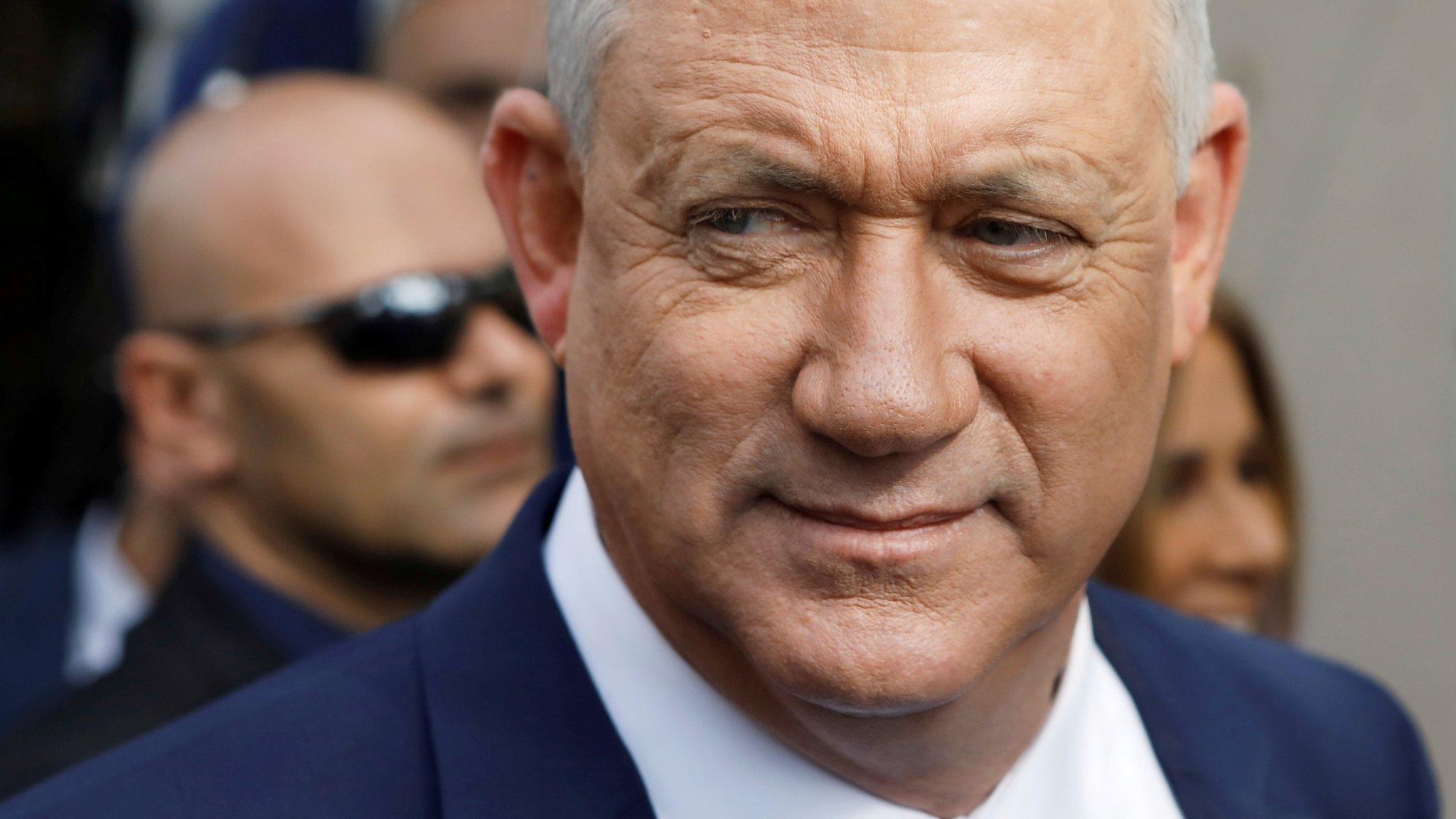Israelis vote in unprecedented third general election in a year
- Published
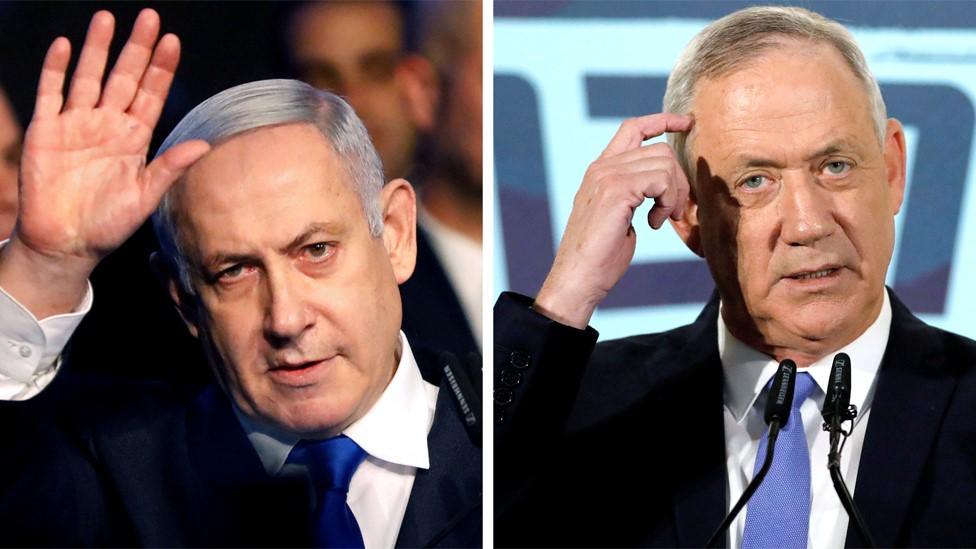
Benjamin Netanyahu's (left) main challenger is his former military chief, Benny Gantz
Israelis are voting in an unprecedented third general election in less than a year, with the prime minister fighting for his political survival.
Neither Benjamin Netanyahu nor his main challenger, Benny Gantz, were able to put together majority coalitions following the last two elections.
The final opinion polls suggested the latest round is too close to call.
Mr Netanyahu is seeking re-election two weeks before he is due to stand trial on corruption charges.
He has been ordered to appear in court in Jerusalem on 17 March to hear the indictment against him.
The prime minister was charged in November with bribery, fraud and breach of trust in connection with three separate cases. He has strongly denied any wrongdoing, saying he is the victim of a politically motivated "witch hunt".
Opponents have called on Mr Netanyahu to step down. But even if convicted, he would not be required to do so until the appeals process was exhausted.
Allow X content?
This article contains content provided by X. We ask for your permission before anything is loaded, as they may be using cookies and other technologies. You may want to read X’s cookie policy, external and privacy policy, external before accepting. To view this content choose ‘accept and continue’.

Casting his ballot on Monday, Israel's President Reuven Rivlin urged citizens to go out and make their voices heard.
"We don't deserve another awful and grubby election campaign like the one that ends today and we don't deserve this never-ending instability. We deserve a government that works for us."

Specially protected polling stations were set up for self-quarantined voters amid the coronavirus outbreak
Mr Netanyahu, 70, is Israel's longest-serving prime minister, having been in office from 1996 to 1999 and again from 2009. In December, he comfortably won a primary election for leadership of his right-wing Likud party.
His main opponent in the general election is Benny Gantz, 60, a retired general who served as chief of staff of the Israel Defense Forces (IDF) before entering politics to lead the centrist Blue and White party.
Why are Israelis heading to the polls again?
Blue and White won one more seat than Likud in the last election in September, but neither Mr Netanyahu or Mr Gantz were able to secure enough support from other parties to enable them to control a majority in the 120-seat parliament.


Weeks of campaigning have failed to budge the sense of grinding political stalemate in Israel.
Voters seem entrenched. The polls suggest neither Mr Netanyahu nor Mr Gantz are sure of a clear path to victory. Again.
Political lightning struck twice on the same day during the campaign, as Trump's peace plan was announced and a corruption trial was set for Mr Netanyahu.
But Israelis seemed unfazed by the thunder. They didn't need to vote three times to make up their minds about Mr Netanyahu and many see the Trump plan as more electoral politics than a serious attempt at resolving an intractable conflict.

Israel's political system is based on a form of proportional representation, with parties winning seats based on the number of votes they receive rather than which party gets the most in a particular constituency. This means governments have always been coalitions, sometimes fractious and short-lived.
Mr Netanyahu's previous coalition lasted for four years before an early election was held in April 2019.
November 2019 - Benjamin Netanyahu rails against corruption charges
In those polls, Likud and Blue and White won the same number of seats. But Mr Netanyahu dissolved parliament after his coalition talks failed, denying Mr Gantz a chance to try form a government himself.
It is unclear what might happen if there is no outright winner again.
Does this election matter?
Despite complaints among voters of election fatigue, Monday's could be one of the most important for years.
If Blue and White wins, it will bring to an end more than 10 years of rule by Likud, which advocates a right-wing nationalist agenda.
(February 2020) The Gharib family's house is in a fenced-off enclave within an Israeli settlement.
If Likud wins and can form a governing coalition, Mr Netanyahu has vowed to annex Jewish settlements and a large corridor of land known as the Jordan Valley, both in the occupied West Bank.
Such a move was made more possible after US President Donald Trump released his Middle East peace plan in January. Mr Trump said the US would "recognise Israeli sovereignty over the territory that my vision provides to be part of the State of Israel", including parts of the West Bank - a departure from previous US positions.
The Trump plan has also been endorsed by Mr Gantz, and while he too has pledged to annex the Jordan Valley and the main settlement blocs, it is less clear whether he would go as far as Mr Netanyahu.

The fertile Jordan Valley makes up a quarter of the West Bank
More than 600,000 Jews live in about 140 settlements built since Israel's 1967 occupation of the West Bank and East Jerusalem. The settlements are considered illegal under international law, though Israel disputes this. The US has also declared it no longer sees the settlements as illegal.
The Palestinians - who have rejected Mr Trump's peace plan as one-sided - insist that all the settlements must be removed if there is to be final peace deal.
Israel elections: Will the Arab Israeli vote swing the third vote in a year
The US plan also proposes ceding a cluster of Israeli-Arab towns and villages into a future Palestinian state - effectively transferring Arab citizens out of Israel.
Israeli Arabs, who comprise about 20% of Israel's population and often complain of discrimination, have been angered by the suggestion.
A strong election result for the Joint List, an alliance of Arab parties, could favour Benny Gantz's chances of forming a government propped up by their support.


- Published1 March 2020

- Published28 January 2020
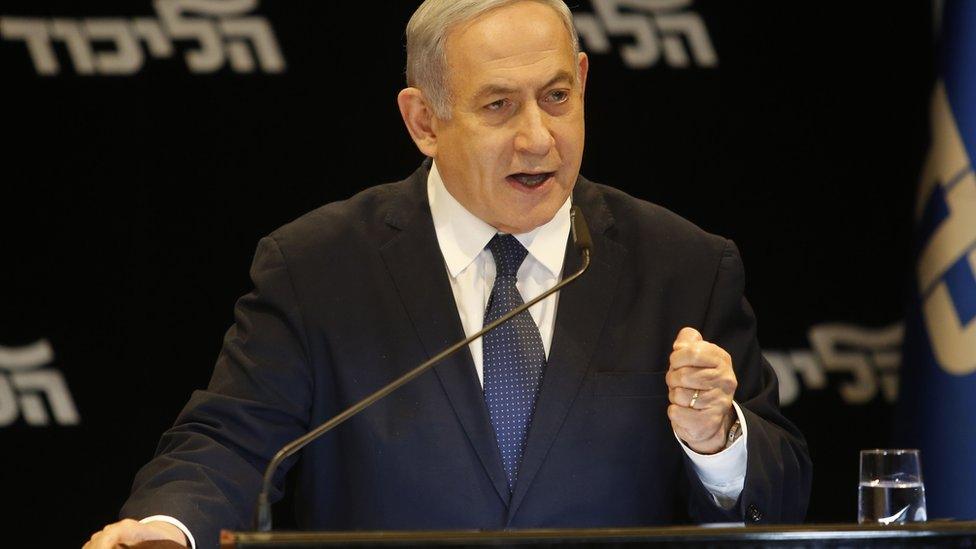
- Published22 November 2019
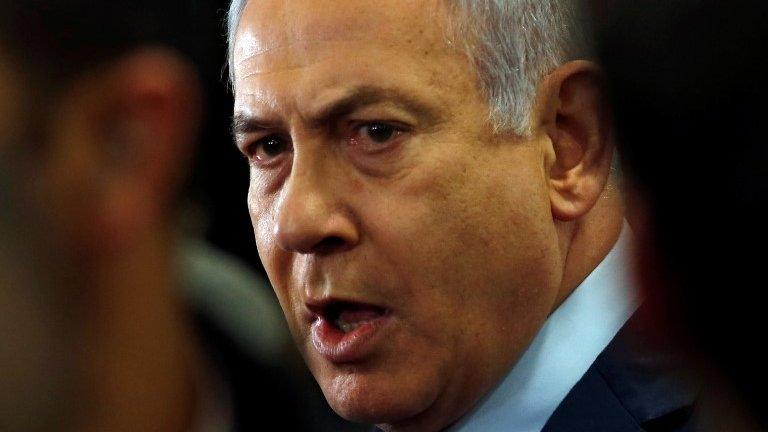
- Published21 November 2019
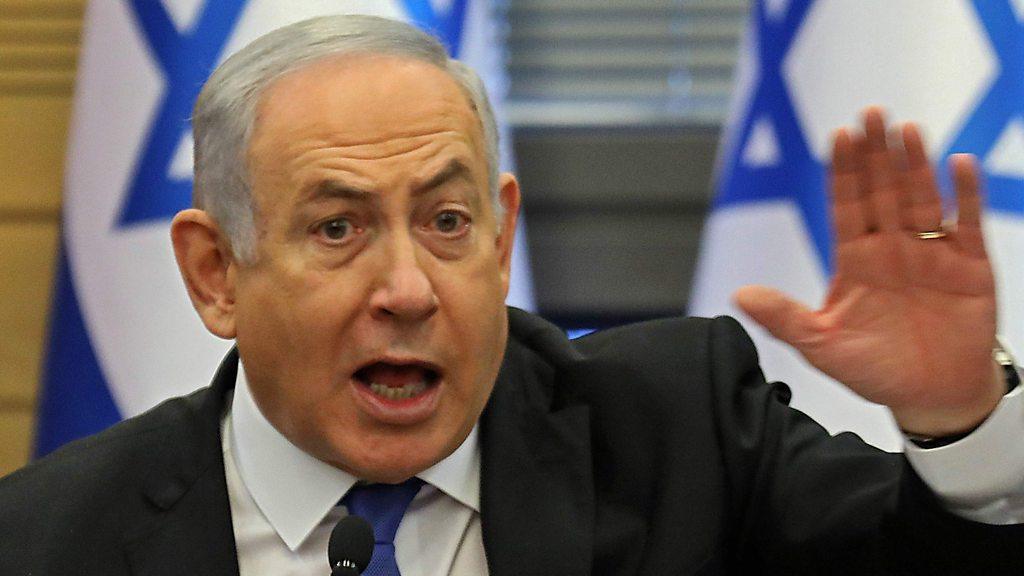
- Published21 November 2024
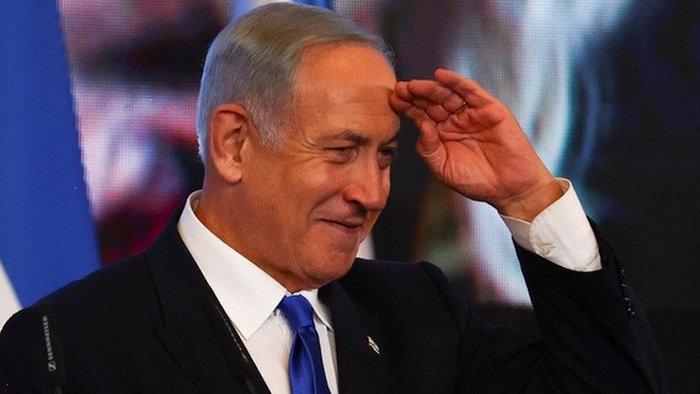
- Published14 May 2020
